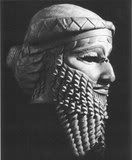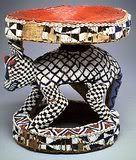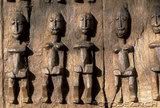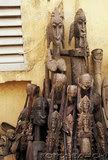Friday, June 1, 2007
Afrocentrism- Pro and Con
History is written by the victors - and conquerors. It is a fact that many white scholars and archaeologists slanted their theories, findings and interpretations to favor white superiority/black inferiority. In some cases, destruction of African evidence of their civilization was done, and in some cases outright fraud and deception was performed.
Most Eurocentrics assert that black Africa had no great civilizations and contributed nothing to the advancement of the human race. Extremist advocates of Afrocentrism assert that virtually all advances in civilization were due to the black Africans who migrated about the globe.
Human brains and creativity is the same among all races. The truth of human histories of all people probably lies somewhere in between these two arguments. / Aggrieved Historian
>>>>>>>>>>>>>
http://skepdic.com/afrocent.html
Afrocentrism
Afrocentrism is a pseudohistorical political movement that erroneously claims that African-Americans should trace their roots back to ancient Egypt because it was dominated by a race of black Africans. Some of Afrocentrism's other claims are: the ancient Greeks stole their main cultural achievements from black Egyptians; Jesus, Socrates and Cleopatra, among others, were black; and Jews created the slave trade of black Africans. The main purpose of Afrocentrism is to encourage black nationalism and ethnic pride as a psychological weapon against the destructive and debilitating effects of universal racism. Some of Afrocentrism's leading proponents are Professor Molefi Kete Asante of Temple University; Professor Leonard Jeffries of City University of New York; and Martin Bernal, author of Black Athena. One of the more important Afrocentric texts is the pseudo-historical Stolen Legacy (1954) by George G. M. James. Mr. James claims, among other things, that Greek philosophy and the mystery religions of Greece and Rome were stolen from Egypt; that the ancient Greeks did not have the native ability to develop philosophy; and that the Egyptians from whom the Greeks stole their philosophy were black Africans. Many of James' ideas were taken from Marcus Garvey (1887-1940), who thought that white accomplishment is due to teaching children they are superior. If blacks are to succeed, he said, they would have to teach their children that they are superior. James's principal sources were Masonic, especially The Ancient Mysteries and Modern Masonry (1909) by the Rev. Charles H. Vail. The Masons in turn derived their misconceptions about Egyptian mystery and initiation rites from the eighteenth century work of fiction Sethos, a History or Biography, based on Unpublished Memoirs of Ancient Egypt (1731) by the Abbé Jean Terrasson (1670-1750), a professor of Greek. Terrasson had no access to Egyptian sources and he would be long dead before Egyptian hieroglyphics could be deciphered. But Terrasson knew the Greek and Latin writers well. So he constructed an imaginary Egyptian religion based upon sources which described Greek and Latin rites as if they were Egyptian (Lefkowitz). Hence, one of the main sources for Afrocentric Egyptology turns out to be Greece and Rome. The Greeks would have called this irony. I don't know what Afrocentrists call it. James's pseudo-history is the basis for other Afrocentric pseudo-histories such as Africa, Mother of Western Civilization by Yosef A.A. ben-Jochannnan, one of James's students, and Civilization or Barbarism by Cheikh Anta Diop of Senegal. Afrocentrism is being taught in many universities, colleges, and public schools.* further reading
Lefkowitz, Mary. Not Out of Africa - How Afrocentrism Became an Excuse to Teach Myth as History (New York: Basic Books, 1996). Reviewed in The Skeptic's Refuge Najovits, Simson. (2003). Egypt, Trunk of the Tree, Vol. 1: The Contexts and Vol. II: The Consequences. Algora Publishing. | ||
| ©copyright 2007 Robert Todd Carroll | ||
>>>>>>>>>>>>>>>>>>
AFROCENTRISM
http://en.wikipedia.org/wiki/Afrocentrism
Afrocentrism is an academic, philosophical, and historical approach to the study of world history. Afrocentrism holds that Eurocentrism has led to the neglect or denial of the contributions of African people and focused instead on a generally European-centered model of world civilization and history. Therefore, Afrocentrism aims to shift the focus from a perceived European-centered history to an African-centered history. More broadly, Afrocentrism is concerned with distinguishing the influence of European and Oriental peoples from African achievements.
Afrocentrism also has connections to Black civil rights movements and anti-imperialist ideologies in the United States and the Caribbean.
Afrocentrists typically focus on indigenous African and African contributions and posit black, Nilotic origins for Western civilization. Philosophically, Afrocentrism is often compared to Eurocentrism; however, the validity of this comparison is heavily debated.
Afrocentricity is the theory that African ethnicity must be viewed within the context of their own culture.
| Pan-African topics |
|---|
| Academics |
| African philosophy |
| Black nationalism |
| Black orientalism |
| Afrocentrism |
| Art |
| FESPACO |
| African Art |
| PAFF |
Contents |
History of Afrocentrism

The origins of Afrocentrism can be found in the work of African-American and Caribbean intellectuals early in the twentieth century. Publications such as The Crisis and the Journal of Negro History sought to counter the prevailing view in the West that Sub-Saharan Africa had contributed nothing of value to human history that was not the result of incursions by Europeans and Arabs.[1] These journals claimed that Ancient Egyptian civilisation was founded by Negroids and investigated the history of Africa. Editor of The Crisis W.E.B. DuBois researched West African culture and attempted to construct a pan-Africanist value system based on West African traditions. DuBois later envisioned and received funding from then Ghanaian president Kwame Nkrumah to produce an Encyclopedia Africana that would chronicle the history and cultures of Africa, but he died before the work could be completed. Some aspects of DuBois's approach are evident in the work of Cheikh Anta Diop, who claimed to have identified a pan-African protolanguage and to have proven that ancient Egyptians were, indeed, Africans.
Diop also drew from the ideas of George James, a follower of black nationalist leader Marcus Garvey, who emphasized the importance of Ethiopia as a great, "black civilization", and who argued that Black peoples should develop pride in African history. James's book, Stolen Legacy (1954) is often cited as one of the foundational texts of Afrocentrism. James claimed that Greek philosophy was "stolen" from ancient Egyptian traditions and that these had developed from distinctively "African" cultural roots. For James, the works of Aristotle and other Greek thinkers were, in fact, poor synopses of aspects of ancient Egyptian wisdom. According to James, the Greeks were a violent and quarrelsome people, unlike the Egyptians, and were not naturally capable of philosophy. James famously claimed in his book that Aristotle had physically "stolen" his ideas and works from a "African" Library of Alexandria, when, in fact, the Library of Alexandria was built by Greeks, during the Hellenistic period of Egypt, and well after Aristotle's death. African American activist Al Sharpton was quoted as saying at Kean College in 1994 that “White folks was in caves while we was building empires... We taught philosophy and astrology and mathematics before Socrates and them Greek homos ever got around to it.”[2]
These ideas were not wholly new. 18th-century Masonic texts referenced ancient writings that claimed Greek philosophers had studied in Egypt. The poet William Blake had also attacked "the stolen and perverted writings of Homer and Ovid, of Plato and Cicero," asserting that they were copies of more ancient Semitic texts. Such views were associated with radical and Romantic thought that rejected classical Greco-Roman culture as the model for civilization. James's distinct contribution was to tie these claims to an opposition between white European and African identity, associating these alleged ancient appropriations of black wisdom with white, imperialist exploitation of African peoples and the theft of artifacts from African cultures. By claiming that the Greeks were barbaric and innately incapable of philosophy, he inverted normative imperialist racial hierarchies, which made the same claims about Africans.
Other writers copied James's approach, which led to claims that Africans originated intellectual or technological achievements that later were claimed by whites. Today, most of these writings are not considered serious scholarship, and modern "Afrocentricity" writers have abandoned James's more extreme claims to concentrate on the notion that modern Black peoples should center their understanding of culture and history on Africa. Molefi Kete Asante's book Afrocentricity (1988) argues that African-Americans should look to African cultures "as a critical corrective to a displaced agency among Africans."
Other authors have adapted James's assertion that Egyptian culture's influence on the Greeks has been underestimated. Among such authors, the most influential is Martin Bernal, whose book Black Athena argued for the influence of Afro-Asiatic and Semitic civilizations on Classical Greece. Other writers simply have focused on the study of indigenous African civilizations and peoples, with the aim of counteracting the emphasis placed on European and Arab influence on the continent. These Afrocentric scholars believe that historians must shift their attention away from European accomplishments and Europe-derived racist assumptions and, instead, emphasize the black origins of mankind and black contributions to world history. They maintain that such a paradigm shift would result in significant attitudinal shifts in the West and elsewhere. Indeed, many claim that a dramatic shift already has occurred. As educational opportunities have broadened for peoples of color over the years, non-white scholars from many cultures increasingly have begun to examine anew the historical and archaeological record. Some of their findings challenge the "Eurocentric" view of world history which for so many centuries was said to have devalued and appropriated, or simply ignored achievements by blacks and other non-Europeans.
Linguists have long studied the roots of the African American English Vernacular, or AAVE. Historically, the assumption was that the AAVE was the combined product of Southern culture and poverty. This assumption implies not only that the AAEV was developed solely in the United States, but that it is a broken derivation of English, rather than a dialect with its own rules and structure. An Afrocentrist scholar would first ask to what degree AAEV shares common rules and words with West African languages — working on the assumption that enslaved Africans kept and transmitted West African cultural traits. Scholars might then ask how the AAEV itself transformed what we understand to be the southern dialect. AAEV is not simply broken English but rather a dialect that shares the same grammatical structure as many West African languages.
The debate over Afrocentrism
Critics counter that much historical Afrocentric research simply lacks scientific merit and that it actually seeks to supplant and counter one form of racism with another, rather than attempt to arrive at the truth. Among these critics, Mary Lefkowitz's Not out of Africa is regarded by some as the foremost critical work. In it, she contends Afrocentric historical claims are grounded in identity politics and myth rather than sound scholarship. Like most other mainstream scholars, she rejects James's views on the ground that his sources predate the decipherment of Egyptian hieroglyphs. She contends that actual ancient Egyptian texts show little similarity to Greek philosophy. She also contends that Bernal underestimates the distinctiveness of Greek intellectual culture. Asante and others, however, dispute her conclusionsTemplate:Fact=april 2007.
Race and Afrocentrism argument
Afrocentrism contends that race still exists as a social and political construct. It argues that racist Eurocentrist ideas about history were adopted for centuries. They claim that according to these ideas, Blacks had no civilization, no written language, no culture, and no history of any note before coming into contact with Europeans. Further, European history commonly receives more attention within the academy than the history of sub-Saharan African cultures or those of the many Pacific Island peoples. Afrocentrists contend it is important to divorce the historical record from past racism. Ironically, it has been contended by many that Afrocentrism itself is racist, as it simply focuses on Africa and often engages in dubious scholarship to support Africa being the cradle of civilization.[citation needed]
Definitions of Pan-African Black identity
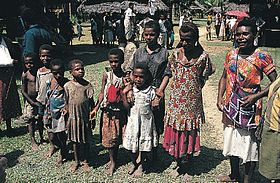
The relationship among racial, cultural and continental identities is one of the more difficult problems in Afrocentic thought. In other instances, the concept of black racial identity has been used to include among "African" peoples populations generally thought of as non-Africans, such as the Australoid (sometimes called "Veddoid") peoples of Australia and New Guinea and the Dravidians of India and the people of the rest of the Indian subcontinent. Also included by some writers in the African diaspora are the "Negritos" of Southeast Asia (Thailand, Java, Borneo, Sumatra and Malaysia, and Cambodia); the "Africoid," aboriginal peoples of Melanesia, Micronesia, and Polynesia; some Afrocentrists also claim that the Olmecs of what is now Mexico came from Africa, though this is not a widespread view among historians of Mesoamerica.[3] Afrocentrics who adopt this approach contend that such peoples are African in a racial sense, just as the white inhabitants of modern Australia may be said to be European.
Criticism of the race theory
Critics argue that such peoples were not recent emigrants from Africa, and the entire population of the world might just as reasonably be considered part of an African race according to the Out of Africa model of human migration. Studies show that some members of these darker-skinned ethnic groups and "Mongoloid" East Asians are genetically closer to one another than they are to indigenous Africans. Afrocentrists argue that such genetic similarities are due to the fact that the aboriginal peoples of Asia were "Africoid" Negritos and Australoid types, who later miscegenated and developed in isolation with populations of the eventually more dominant Mongoloid phenotype over time. They contend these facts do not change the fundamental black racial identity of these peoples based on the traditional metrics of the classic "Negroid" phenotype, physical similarities with other peoples classified as Negroid, presumptive patterns of prehistoric migrations and, in some cases, what they contend are cultural similarities. Arguments advancing the notion of racial similarities between a Nubian and a Dravidian, both classified as Negroid, Afrocentrists contend, are far more credible than those of between, say, a Swede and a modern-day Turk, both classified as Caucasian. Traditional racial classifications, after all, are not based on genetics, but on phenotype. In such matters, Afrocentrists adopt the pan-Africanist perspective that such people of color are all "African people" or "diasporic Africans." As Afrocentric scholar Runoko Rashidi writes, they are all part of the "global African community." This view, however, disregards how most "Mongoloid" East Asians identify themselves and the conclusions of geneticists about population relatedness.

In 2002, geneticist Spencer Wells completed a study of human out-migrations from Africa utilizing the DNA of San Bushmen of the Kalahari who, according to Wells, have the oldest distinctive DNA lineage on earth. Wells concluded from analysis of DNA specimens that the earliest human emigration from Africa of which there is definitive proof was that of ancestors of the San Bushmen to southern India and then along coastal routes to Australia (the Aborigines), while shortly afterwards a second migration from Africa, also by ancestors of San Bushmen, reached Central Asia, and thence covered most of the Eurasian continent.
The single origin hypothesis (also known as the "Out of Africa" hypothesis) posits that the Homo sapiens evolved in Africa, later migrating and populating other continents, out-competing other related species such as that exemplified by Java man.
Afrocentrism and the academy
A primary concern of Afrocentrism has been to engage what they claim to be biased methods and approaches used by European scholars, and the allegedly European dominated academy in relation to the African people, including Egypt. A seminal moment for Afrocentrism was the presentation of Senegalese scholar Cheikh Anta Diop, at the 1974 UNESCO symposium "The Peopling of Ancient Egypt and the Decipherment of Meroitic Script," [4]which attacked a long history of biased scholarship. In the words of one historian of Egypt, Jean Vercoutter, who attended:
| “ | Whilst acknowledging that the ancient Egyptian population was 'mixed', a fact confirmed by all the anthropological analyses, writers nevertheless speak of an Egyptian 'race', linking it to a well defined human type, the white, 'Hamitic' branch, also called 'Caucasoid', 'Mediterranean', 'Europid' or 'Eurafricanid'. There is a contradiction here: all the anthropologists agree in stressing the sizeable proportion of the Negroid element--almost a third and sometimes more--in the ethnic [i.e. biological] mixture of the ancient Egyptian 'population', but nobody has yet defined what is meant by the term 'Negroid', nor has any explanation been proffered as to how this Negroid element, by mingling with a 'Mediterranean' component often present in smaller proportions, could be assimilated into a purely Caucasoid race." | ” |
As regards definitions, Afrocentrists allege that European scholars carefully define Black peoples as narrowly as possible, creating an extreme "true Negro" south of the Sahara, while allocating all else not meeting the extreme type to "Caucasoid" groupings, including Ethiopians, Egyptians and Nubians (C. G. Seligman's Races of Africa, 1966)[6] French historian Jean Verncoutter (quoted above) argues that selective grouping is common among scholars where the ethnicity of the ancient Egyptians is involved, with Negroid remains being routinely classified as "Mediterranean" even though they were recorded in substantial numbers by archaeological workers ( Vercoutter 1978- The Peopling of ancient Egypt)[7] Afrocentrists also point of the work of Czech anthropologist Eugene Strouhal which describes both physical, cultural and material links of ancient Egypt with the peoples of Nubia and the Sahara, ( Strouhal (1968, 1971- Strouhal, E., ‘Evidence of the early penetration of Negroes into prehistoric Egypt)[8], the analyses of Falkenburger (1947) which show a clear Negroid element, especially in the southern population and sometimes as predominating in the predynastic period[9], and the research of archealogist Bruce Williams which argues for a Nubian influence on formation of the Egyptian kingships. [10] They also cite recent mainstream restudies which confirm the "mixed" character of the Egyptian people.[11]
Afrocentrists also allege that the academy has continued to use theories of white civilizers flowing into Africa to explain the civilizations there, being unwilling to attribute any elaborate developments to blacks. Ironically, prominent Afrocentric critic Mary Lefkowitz at times finds some common ground with Afrocentrists. In her "Not Out Of Africa"[12], Lefkowitz notes that a number of earlier historical theories suggesting Caucasians initially sweeping into ancient Egypt from the north have been rendered untenable by modern research, which suggests a movement of peoples from the South, up from the Sahara into the Nilotic zone.
"Recent work on skeletons and DNA suggests that the people who settled in the Nile valley, like all of humankind, came from somewhere south of the Sahara; they were not (as some nineteenth-century scholars had supposed) invaders from the North. See Bruce G. Trigger, "The Rise of Civilization in Egypt," Cambridge History of Africa (Cambridge, Cambridge University Press, 1982), vol I, pp 489-90; S. O. Y. Keita, "Studies and Comments on Ancient Egyptian Biological Relationships," History in Africa 20 (1993) 129-54."
On the basis of this varied research, some Afrocentrists argue that the Egyptians could indeed be classified as "Black." Other writers however argue that while the Egyptians clearly showed a range of types, including dark-skinned individuals others, calling them "Black" was an application of the "one-drop" rule of American culture, which would have been alien to the ancient Egyptians.[12] Afrocentrists reply that they are justified in doing so since the European academy routinely uses narrow definitions of Blacks, and uses subtle code for "Caucasoid" under such terms as "Mediterranean" or "Middle Eastern."[13]
Afrocentrists hold that Africans exhibit a range of types and physical characteristics, and that such elements as wavy hair or aquiline facial features are part of a continuum of African types that do not depend on admixture with Caucasian groups. They cite the nonracial approach of Hiernaux (1975)[14] and Hassan (1988)[15] which demonstrates that populations can vary based on microevolutionary principles (climate adaptation, drift, selection), and that this variation is present in both living and fossil Africans (AMERICAN JOURNAL OF PHYSICAL ANTHROPOLOGY 87:245-254 (1992))[16]They condemn attempts to split African peoples into racial clusters as new versions of older, discredited theories such as the "Hamitic Hypothesis" and the Dynastic Race Theory that attempted to separate out African groups like Nubians, Ethiopians and Somalians into "Caucasoid" groups that entered Africa to bring civilization to the natives. They also charge a double standard at play in the European academy which has made little attempt to define a "true white", [17]but does not hesitate to define Blacks as narrowly as possibly, while allocating as much as possible to broad "Caucasoid" or other categories when it comes to Egypt or other African civilizations. Afrocentric writer C.A. Diop captures this belief in a double standard as follows:
- "But it is only the most gratuitous theory which considers the Dinka, the Nouer and the Masai, among others, to be Caucasoids. What if an African ethnologist were to persist in recognising as white only the blond, blue-eyed Scandinavians, and systematically refused membership to the remaining Europeans, and Mediterraneans in particular--the French, Italians, Greek, Spanish, and Portuguese? Just as the inhabitants of Scandinavia and the Mediterranean countries must be considered as two extreme poles of the same anthropological reality, so should the Negroes of East and West Africa be considered as the two extremes in the reality of the Negro world. To say that a Shillouk, a Dinka, or a Nouer is a Caucasoid is for an African as devoid of sense and scientific interest as would be, to a European, an attitude which maintained that a Greek or a Latin were not of the same race." [18]
Afrocentrists claim a growing acceptance of Egypt as an African culture with its own unique elements, citing mainstream scholars like Bruce Trigger of the Oriental Institute of Chicago who decries many approaches of the past as 'marred by a confusion of race, language, and culture and by an accompanying racism'.[19] and the approach of Egyptologist Frank Yurco, who sees the Egyptians, Nubians, Ethiopians, Somalians, etc as one localized Nile valley population, that need not be artificially clustered into racial percentages.[20] Afrocentric critic Mary Lefkowitz also argues against applying racial categories or terminology, holding that the ancients should stand by themselves in the context of their own times.[21]
Egypt and the argument of African cultural unity
One of the most common claims of afrocentrist historians is that dynastic Egypt was an indigenous African civilization. Although modern Egypt is geopolitically located in the Middle East, Egypt is geographically located in the African continent, and afrocentrist historians argue that Egypt should be understood, in historical terms, as an African state.
The basis of this argument is the belief that the salient cultural characteristics of ancient Egypt are indigenous to Africa and that these features are present in other African civilizations.[22] Critical of much of mainstream Egyptology, Afrocentrists are of the opinion that the study of ancient Egyptian culture artificially disconnects it from other early African civilizations, such as Kerma and the Meroitic civilizations of Nubia — particularly in light of the fact that archaeological evidence clearly indicates a confluence among this cultural triad.[23] This perspective, championed by the Senegalese scholar Cheikh Anta Diop, is known formally as the Cultural Unity Theory. This theory has proponents outside Afrocentric circles, among them Bruce Williams of the Oriental Institute of Chicago. Afrocentrists also claim that these civilizations made significant contributions to ancient Greece and Rome during their formative periods.
The more conventional belief among archaeologists and Egyptologists such as Frank J. Yurco and Fekri Hassan and historians is that the ancient Egyptian civilization was a unique mix of indigenous Nilotic peoples, related, in terms of culture and language, to the Afro-Asiatic language family spoken across northern Africa, Chad and the Horn of Africa and by the Beja of the Sudan. people.[24] The conventional belief in a non-Negroid Egypt has been challenged by scholars who believe the cultural similarities between Egypt and the Levant are due to the exportation of cultural elements from the Nilotic civilizations, rather than the reverse.
[edit] Egypt's Sphere of influence Debate

This Afrocentric view finds itself in direct opposition to the conclusions of Eurocentric scholars such as British historian Arnold Toynbee, who regarded the ancient Egyptian cultural sphere as having died out without leaving a successor, and who derided as "myth" the idea that Egypt was the "origin of Western civilization." However, there are numerous accounts in the historical record dating back several centuries wherein scholars have written of an Egypt and its contributions to Mediterranean civilizations.[citation needed]
Criticism of Afrocentrism
Afrocentrism is generally rejected in the academic community because it is generally not regarded as an academic theory or idea but rather a social and political one, teaching invented history for the sake of the individual and the political rather than the historical. The claims against Eurocentrism are often so broad and unsupported as to be tantamount to conspiracy theory; often, they cannot be proved or disproved.
One of Afrocentrism's most prominent critics, Mary Lefkowitz has characterized Afrocentricity as "an excuse to teach myth as history." Likewise, African-American History professor Clarence E. Walker has proclaimed it to be "a mythology that is racist, reactionary, and essentially therapeutic." Afrocentrists, however, level similar charges at what they charge is a pronounced Eurocentrism in mainstream historical scholarship, and argue that the Afrocentrist approach merely attempts to set the historical record straight by overturning a false, racially skewed paradigm.
General Criticism
A number of criticisms continue to be levelled against Afrocentricity. The most common counter argument is there is no center in Africa. Rather, African diasporal cultures emanate from a variety of different places and sources, making it difficult or impossible to locate a composite African source. The focus on Egypt as opposed to other African civilizations is also criticized as reflecting a desire to mimic European views of Greece. Another common critique is of the United States-centered nature of the Afrocentric project. Although the largest African diasporic population exists in Brazil rather than in North America, the scholarship is overwhelmingly concentrated on the latter, and the experience and values of Black Americans have been taken as normative.
Afrocentrists say most Brazilians with African blood do not consider themselves Black even with prominent African features. Brazil has never produced a black civil rights movement that asserted its African roots. Similarly, modern day Egyptians vary in skin tone and phenotype, including the Copts, who prefer to be classed as North African Caucasoid or caucasian. According to Afrocentrist authors, the eurocentric paradigm has taken hold of the social fabric of diasporic African peoples, thereby the need for Afrocentrism to counteract the paradigm with the greatest civilization Africa has produced.[citation needed]
List of prominent Afrocentric authors
- Molefi Kete Asante, professor, author: Afrocentricity: The theory of Social Change; The Afrocentric Idea; The Egyptian Philosophers: Ancient African Voices from Imhotep to Akhenaten
- Ishakamusa Barashango, college professor and lecturer; founder, Temple of the Black Messiah, School of History and Religion; co-founder and creative director, Fourth Dynasty Publishing Company, Silver Spring, Maryland
- Hakim Bey, leader of the Moorish Science Temple, author of the "Journal of the Moorish Paradigm"
- Jacob Carruthers, Egyptologist; founding director of the Association for the Study of Classical African Civilization; founder and director of the Kemetic Institute, Chicago
- Cheikh Anta Diop [4],[5], author: The African Origin of Civilization: Myth or Reality; Civilization or Barbarism: An Authentic Anthropology; Precolonial Black Africa; The Cultural Unity of Black Africa: The Domains of Patriarchy and of Matriarchy in Classical Antiquity; The Peopling of Ancient Egypt & the Deciphering of the Meroitic Script
- H.B. ("Barry") Fell, Harvard professor, linguist, author: Saga America, 1980 [6]
- Drusilla Dunjee Houston, lecturer, syndicated columnist, author: Wonderful Ethiopians of the Ancient Cushite Empire, 1926.
- Yosef Ben-Jochannan, author: African Origins of Major "Western Religions"; Black Man of the Nile and His Family; Africa: Mother of Western Civilization; New Dimensions in African History; The Myth of Exodus and Genesis and the Exclusion of Their African Origins; Africa: Mother of Western Civilization; Abu Simbel to Ghizeh: A Guide Book and Manual
- Runoko Rashidi [7], author: Introduction to African Civilizations; The global African community: The African presence in Asia, Australia, and the South Pacific
- J.A. Rogers, author: Sex and Race: Negro-Caucasian Mixing in All Ages and All Lands : The Old World; Nature Knows No Color Line; Sex and Race: A History of White, Negro, and Indian Miscegenation in the Two Americas : The New World; 100 Amazing Facts About the Negro With Complete Proof: A Short Cut to the World History of the Negro
- Ivan van Sertima, author: They Came before Columbus: The African Presence in Ancient America, African Presence in Early Europe; Blacks in Science Ancient and Modern; African Presence in Early Asia; African Presence in Early America; Early America Revisited; Egypt Revisited: Journal of African Civilizations; Nile Valley Civilizations; Egypt: Child of Africa (Journal of African Civilizations, V. 12); The Golden Age of the Moor (Journal of African Civilizations, Vol. 11, Fall 1991); Great Black Leaders: Ancient and Modern; Great African Thinkers: Cheikh Anta Diop[8]
- Chancellor Williams, author: The Destruction of Black Civilization: Great Issues of a Race from 4500 B.C. to 2000 A.D.
- Théophile Obenga, author: Ancient Egypt and Black Africa : a student's handbook for the study of Ancient Egypt in philosophy, linguistics, and gender relations
- Asa Hilliard, III, author: SBA: The Reawakening of the African Mind; The Teachings of Ptahhotep
- African philosophy
- African writing systems
- Afro-asiatic languages
- Axum
- Black Athena
- Cultural appropriation
- Egyptology
- Ethnocentrism
- Eurocentrism
- Great Zimbabwe
- Historiography
- History of ancient Egypt
- Kamau Kambon
- Kush
- Meroe
- Nilotic
- Nubia
- Sub-Saharan Africa
- Sun Ra
- Tutankhamun
Labels: Afrocentrism- Pro and Con
Subscribe to Comments [Atom]









